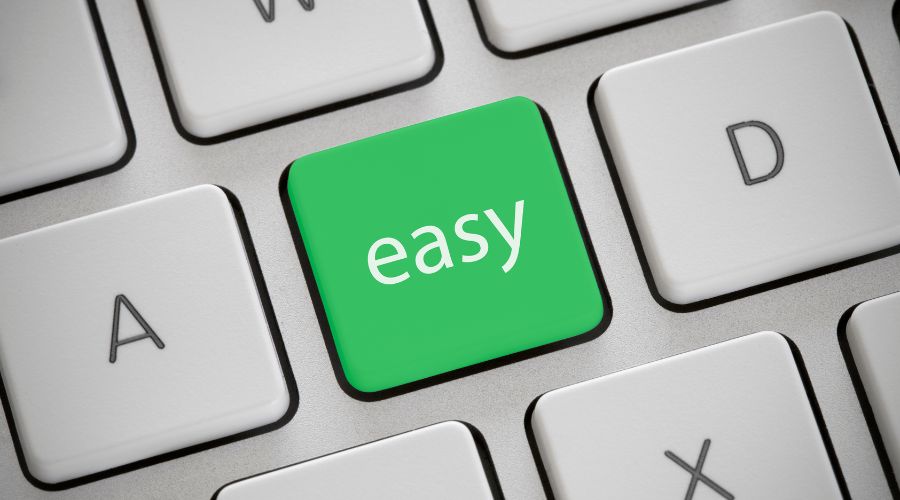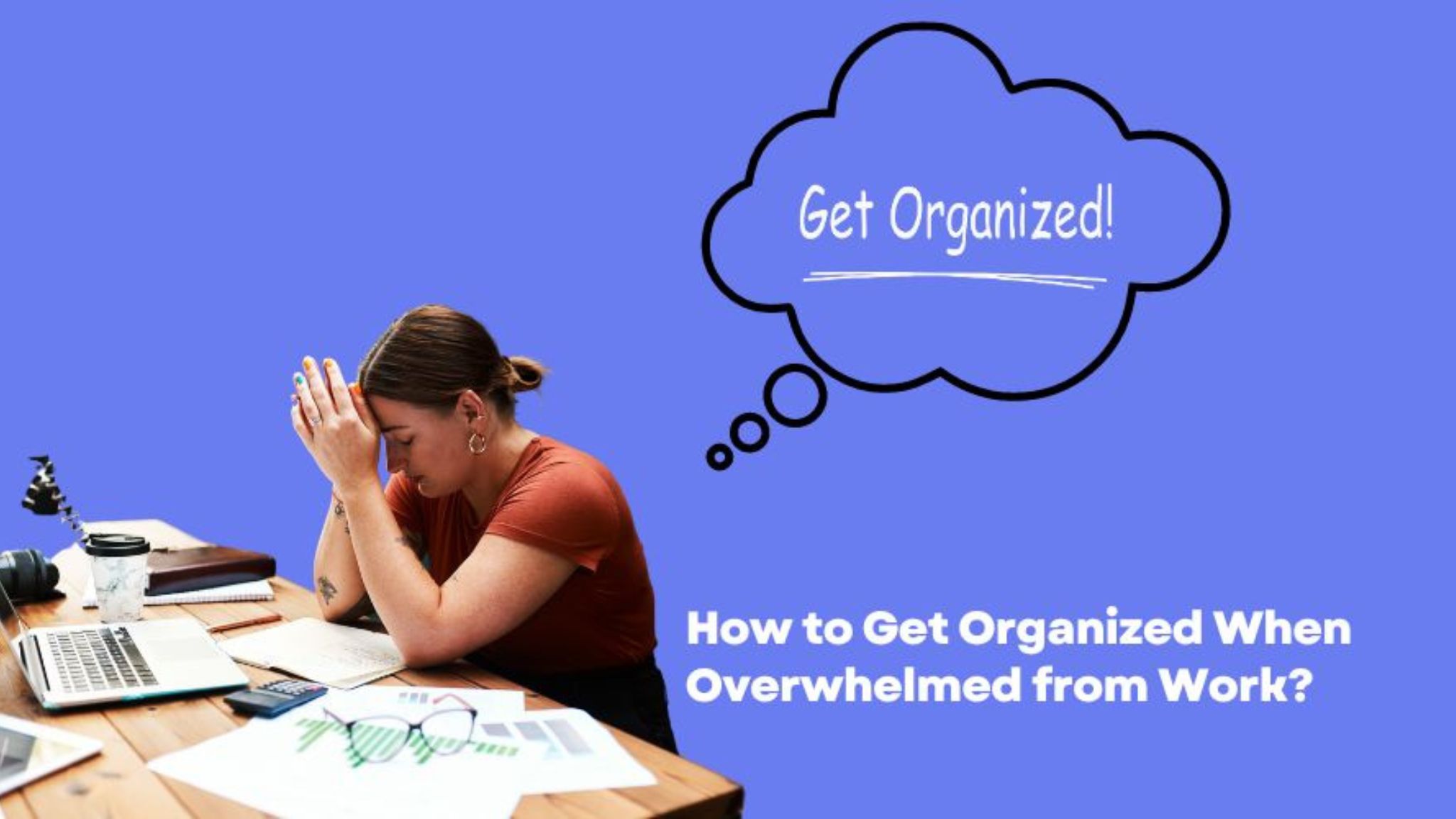Wondering how to get organized when you’re feeling overwhelmed with work?
Do you feel like you’re in a limbo, with your tasks all over the place, and you can’t put the puzzle pieces together no matter how much you try?
In today’s fast-paced world, it’s common for many people to feel pressured by the demands of their jobs.
So, if you’re one of those who are faced with an endless to-do list and competing deadlines, knowing where to begin or how to prioritize can be challenging.
The good news is that staying organized when you feel overwhelmed at work is a skill that you can learn.
And with the right strategies and mindset, you can still get things done even during a hectic workday.
Read this post for some tips to help you navigate this common yet challenging experience.
What to Do When You’re Feeling Overwhelmed at Work?
1. Understand that feeling overwhelmed is normal

The worst thing you can do when there’s so much stuff to be done is to go on a guilt trip or make yourself suffer on purpose.
After all, an overwhelming workload is something that you can normally expect in life.
Accepting and reorienting your thoughts toward a more optimistic outlook can be a powerful aid instead against the feeling of being overwhelmed.
2. Take deep breaths
Taking deep breaths is an easy but effective way to deal with stress and feeling overwhelmed.
When you’re feeling stressed out, you tend to breathe quickly and shallowly, making you feel even more like an overwhelmed employee.
So, to make things feel more manageable and less overwhelming, find a quiet, comfortable place where you can close your eyes and peacefully work on deep breathing.
Slowly take in air through your nose to fill your lungs. Hold your breath for a few seconds, then gradually let it out through your mouth.
This will help you reduce, if not completely eliminate, any worry or tension in your body.
Do this several times, letting your breath become slower, deeper, and more regular.
Repeating this step will eventually help you feel more centered and focused on your list of tasks.
It will also help you avoid getting distracted so you can do your work more quickly and efficiently.
3. Look at the full picture

When you’re in “I’m working” mode, it can be easy to only think about the tasks and commitments right in front of you.
But the best way to get things done is to take a step back, look at the whole situation, and see things more objectively.
And to do that…
4. Set aside time to write down all your tasks
It might seem counterintuitive to write down everything you need to be doing for the rest of the day.
However, it actually increases your productivity since this exercise lets you stay on top of your important tasks.
It’s so easy to do, too. Simply start by making a list of all the responsibilities you have right now.
Writing everything down means you can see the bigger picture and figure out which tasks you don’t really need to do by yourself.
Doing it this way can also help you remember what you need to get done first without having to think too much about it.
This gives you extra time to focus more on the job at hand.
5. Make the tasks more manageable

Once you have your big list of tasks and projects, be sure to divide them into smaller responsibilities.
By breaking down tasks into smaller chunks and delegating others that don’t seem in line with your role, you can manage your workload and complete it with less tension and with a sense of accomplishment.
6. Creatively organize tasks with deadlines
Keeping track of everything can be challenging, but it doesn’t have to be.
One way to deal with this problem is to make a plan or timeline using a calendar.
Using a calendar for a to-do list means you can categorize them by order of importance, making them easier to complete.
This can also help you keep others from putting things off and ensure that the job moves forward.
Giving your priority list different colors is another good way to show how important or urgent the assignment is.
For example, you can use “red” to highlight tasks due in the next 24 hours and “yellow” to show tasks due for next week.
Use a simple task management app, like Orderrly, to keep track of dates and assign team members their tasks.
This will help you stay organized and keep everyone on the same page while ensuring that everything is proceeding as scheduled.
It will also make you better organized and less anxious about your performance, thus positively affecting your mental health.
7. Start with the easy and then difficult tasks

Beginning with simple tasks and progressing to more difficult ones is also a helpful strategy to get organized when you are overwhelmed.
By getting the easier tasks out of the way, you can avoid procrastinating and bring a sense of order to your day even when you haven’t taken on the more challenging ones yet.
Not only does it help you prioritize your duties, but you’ll also avoid getting bogged down in the particulars.
You’ll feel motivated, too, since you’ll slowly gain momentum as the day goes on.
Apart from that, starting with the simpler duties can help you identify any potential roadblocks you may encounter when you start working on the more complex responsibilities.
8. Use timers when you start working
Using a time-tracking tool when you work is a great way to get organized when you feel overwhelmed.
When we have a long list of things to do, figuring out where to start and how long you should work on each task can take time.
Therefore, setting a timer means you get to pay more attention to the job at hand and get more done.
Because you know how long you must work, you’re more aware of how you spend your energy and learn better time management tips.
In addition, using a time-tracking tool helps you focus more and reduce distractions.
Since you have a limited amount of time to complete a task, you are less likely to get distracted by social media, emails, or other time-wasting activities.
9. Be sure to take breaks

Another good tip when you’re overwhelmed from all the things you have to do is to take breaks.
It can be tempting to keep going when the list is overwhelming.
However, taking breaks at regular intervals is essential for your physical, mental, and emotional health.
Not only does it help you feel less stressed and happier, but you’ll also feel inspired and rejuvenated when tackling tasks.
Your break times can be as simple as taking a brief walk, stretching, or removing clutter from your entire house.
10. Set realistic expectations when you make your list on what to complete on a given day
This step might seem simple and not worth mentioning, but you’d be surprised at how so many people don’t apply it.
In fact, I can no longer count by hand how many times I’ve met co-workers who tend to cram way too many responsibilities into their daily schedules.
The downside is, there’s a common theme I’ve observed from them: they usually finish the day feeling stressed about not completing their work.
To avoid this all-too-common scenario, it’s important, therefore, that you be realistic about your capacity.
Assess your workload and take the time to organize the tasks by importance and urgency.
Be honest with yourself about how much time and energy each task will take, then break them down into smaller steps.
Remember, it’s better to aim for quality over quantity.
Doing this will also give you greater flexibility in your schedule and create more space for a healthier you.
After all, trying to do too much at once doesn’t help. It can be counterproductive and may lead to burnout instead.
11. Give yourself a reward every time you complete a part of your tasks

This is likely one of the most important tips to get organized.
When you set some goals for yourself and accomplish them, it’s important to acknowledge your hard work and the progress you’ve made.
This reinforces positive behavior and motivates you to continue your efforts.
Some ideas include treating yourself to a favorite snack or watching an episode of your favorite show.
As you can see, the rewards you give yourself can be simple or elaborate, depending on your preferences and budget.
What’s more important is to make the reward meaningful and enjoyable to you so that you can continue using it in the future to celebrate your progress and accomplishments.
12. Seek professional help
If all the tips we mentioned above aren’t enough to help you get organized when you’re completely overwhelmed, there’s one other thing you can do.
Seek professional help.
Talking to a therapist or counselor can provide you with a safe space to express your feelings.
They can also give you more professional guidance on how to manage your workload and stress levels.
At the same time, they can help you develop coping mechanisms that are specific to your needs.
Don’t be afraid to reach out for help if you need it—taking care of your mental health is just as important as completing your work on time.
Check Out These Book Recommendations!
Do you feel like it’s time to organize?
Fortunately, there are many resources available to help you get back on track.
Here are some books we recommend:
1. Beyond Collaboration Overload: How to Work Smarter, Get Ahead, and Restore Your Well-Being by Rob Cross
This book provides you with practical insights and strategies to optimize your productivity while averting the negative effects of collaboration overload on your well-being.
2. Choosing Courage: The Everyday Guide to Being Brave at Work by Jim Detert
This practical guide is helpful for overcoming anxiety and making courageous decisions at work.
3. The Most Powerful You: 7 Bravery-Boosting Paths to Career Bliss by Kathy Caprino
The book provides a systematic method for women to recognize and change self-defeating patterns and limiting attitudes. It also lists down tips to gain the bravery and self-assurance you need to forge successful professional lives.
Whether you’re looking for practical tips, inspiring stories, or actionable strategies, these three books can be valuable resources.
Frequently Asked Questions
Why am I so easily overwhelmed with work?
Numerous factors may contribute to feelings of work overload. These can include unrealistic deadlines, unclear expectations, a heavy caseload, a lack of support or resources, and personal issues.
How do I stop being overwhelmed with stress at work?
The 12 ways we mentioned above are some of the easiest ways to get started. However, we suggest that you look into what is specifically causing your stress so you can effectively address it.
Use Orrderly to Get Organized When You Are Overwhelmed by Your Workload
Overwhelm is a common feeling in today’s fast-paced workplace.
The good news is that there are plenty of tools, like Orderrly, that lets you write everything you need to do and organize it later.
This way, you can manage your tasks, reduce stress, and feel more in charge.
So, if you’re overwhelmed at work, try our simple project management tool and see how it can improve your workday!

